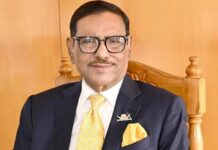UN Resident Coordinator tells The Daily Star about Bangladesh’s potential, challenges

Bangladesh’s development will skyrocket if it can avoid political violence, and ensure constructive politics and gender equality, outgoing UN Resident Coordinator Neal Walker has said.
There is no doubt that Bangladesh will be a marvellous place, if it can avoid violence, provide conducive environment for investment and development, ensure law and order and uphold justice, he said in an exclusive interview with The Daily Star.
Politics needs to be focused more on the needs of people and alternative voices. It will happen only when the two main political parties speak to one another, Walker said.
He leaves for Ukraine this weekend to join as the top UN official there after his three-and-a-half year stint in Bangladesh. He worked here closely with the government and different development partners in many programmes and policies.
Earlier, he had worked for the UN in Central Asia, Latin America, Northeast Asia and Africa since 1990.
Bangladesh faced many challenges because of a horrific war, famine and cyclone in the initial years of its birth, but it made tremendous strides on the social and economic fronts that were rarely possible for any country in such a short time, said Walker.
Even before the UN set the Millennium Development Goals (MDGs) in 2000, successive governments in Bangladesh since the 1990s had prioritised growth with equity and social objectives associated with the MDGs. Its achievements in disaster management, poverty reduction, cutting down child and maternal mortality and female education are impressive.
He, however, said much more needs to be done. Though Bangladesh has achieved food security, some 40 percent children under five are malnourished. Child marriage and violence against women still remain big problems.
According to official data, 65 percent of girls are married off before they reach 18 while maternal mortality rate stands at 194 per lakh. Moreover, 87 percent of women fall victims to violence by their husbands.
To address these problems, Walker gave two suggestions — ensuring gender equality and constructive politics.
“Only when women are fully and equally engaged as true partners of development, the country will excel,” he said, recommending more investments in female education, health and other opportunities.
In many countries, it has been observed that if money is given to men, they don’t use it as wisely as women for the future generation. Women invest in their children first and foremost, he said.
“So, if Bangladesh invests in its women, this will have powerful secondary impacts in terms of the quality of the new generation coming up and living. That is perhaps the top element,” Walker said.
He also stressed the need for independence of parliament, judiciary, civil service, police and the media.
“Media needs to express freely, not as an element of the government, but as the voice of people … that is the fundamental basis of a free society,” he said.
Bangladesh is not doing enough on the environmental front. Though the country focuses on its environmental rights at global forums, it is not doing enough to keep air or water clean back at home, said the UN official.
Even then, Walker leaves Dhaka with high expectations for Bangladesh and great respect and admiration for its people.
“You cannot help but be inspired as you go around the country as you see the way people are thinking, the way people are working,” he said.
Source: The Daily Star









